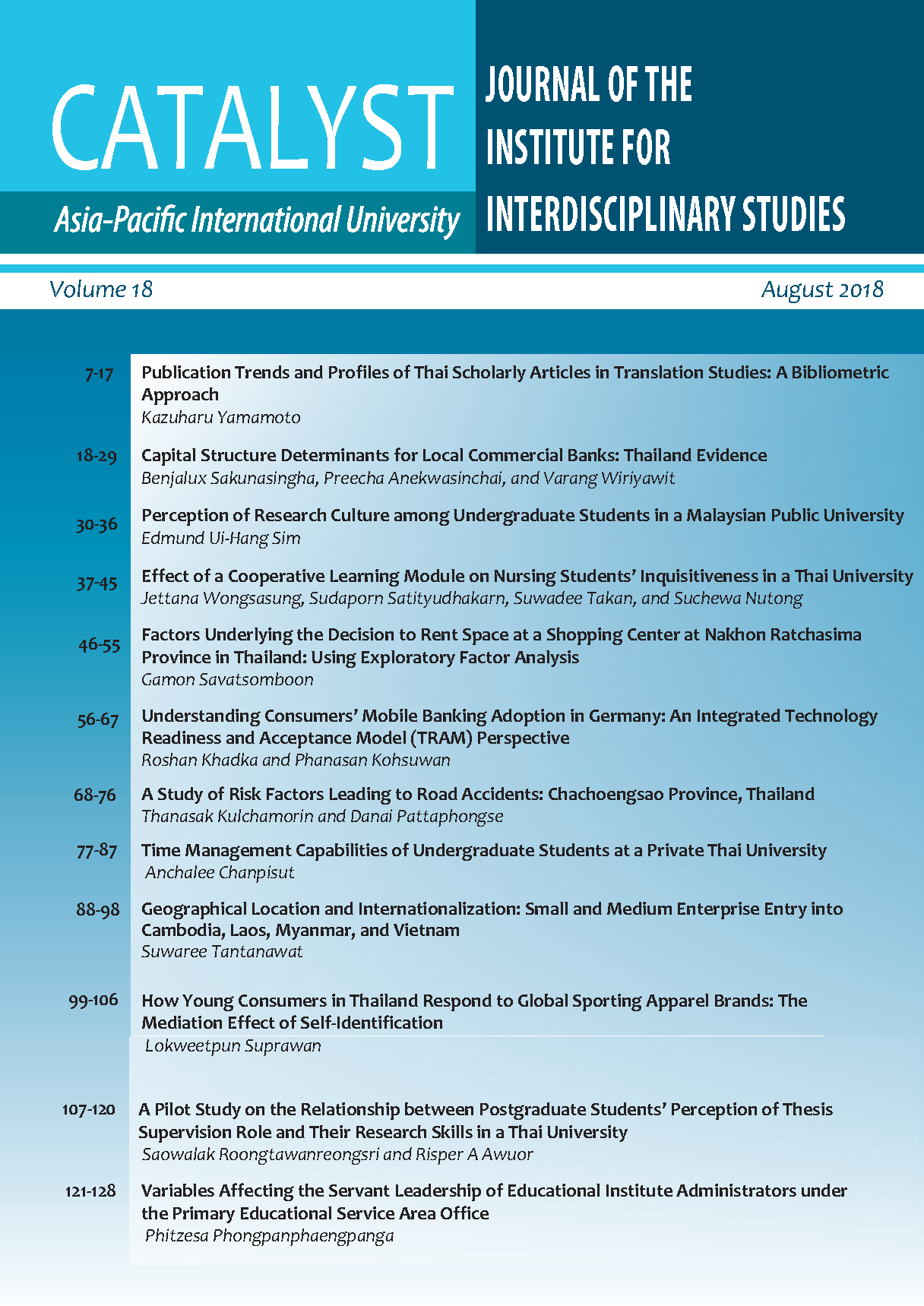Variables Affecting the Servant Leadership of Educational Institute Administrators Under the Primary Educational Service Area Office
Main Article Content
Abstract
The research reported here involved primary school administrators (n = 42) under the Primary Education Service Area Offices for the provinces of Buriram, Chaiyaphum, Khon Kaen, Nakhon Ratchasima, and Surin in the lower northeastern region of Thailand during the 2016 academic year. It was found that: 1) The educational administrators displayed a “very high” level of servant leadership, which differed slightly among the administrators. 2) The variable that directly influenced administrators’ servant leadership was achievement motivation, which accounted for 65.30 percent of the variance (p < .01 level); and 3) The administrators’ servant leadership was indirectly influenced by their practices according to the four sublime states of mind: Loving-kindness, Compassion, Sympathetic Joy, and Equanimity and Learning Motivation, acting through their achievement motivation. Their work responsibilities directly influenced their practices, according to the four sublime states of mind and learning motivation.
Article Details

This work is licensed under a Creative Commons Attribution-NonCommercial-NoDerivatives 4.0 International License.
Copyright: Asia-Pacific International University reserve exclusive rights to publish, reproduce and distribute the manuscript and all contents therein.
References
Chaiyapheuk, B. (2007). A study of servant leadership characteristics and school climate of infant Jesus Sister Schools. Master’s Project, in Educational Administration. Bangkok: Srinakharinwirot University. Retrieved from http://thesis.swu.ac.th/swuthesis/Ed_Adm/Bang-orn_C.pdf
Greenleaf, R. (2002). Servant Leadership: A journey into the nature of legitimate power and greatness. New Jersey: Paulist Press.
Innok, N. (2013). Variables affecting to a level of academic leadership of school directors. Doctor of Education Dissertation in Educational Administration. Nakhon Ratchasima: Vongchavalitkul University.
Lengpanich, J. (2011). A structural equation model of servant leadership for basic school administrators. Doctor Philosophy Dissertation in Education Administration, Khon Kaen: Khon Kaen University. Retrieved from http://programevaluation.kku.ac.th/student/student_detail/517050030?locale=th
Martin, M., Gregory, K., Stemler, S. (Editors) (2000). TIMSS 1999 technical report: International science report findings from IEA’s report of the third international mathematics and science study at the eighth grade. Chestnut Hill, MA: International Study Center, Lynch School of Education, Boston College. Retrieved from https://timssandpirls.bc.edu/timss1999i/pdf/T99_TR.book.pdf
Meemheuy, T. (2010). Servant leadership, spirituality in organization and job performance of managers in a private food industry business in Bangkok. Thesis. Master of Sciences in Industrial Psychology. Bangkok: Kasetsart University. Retrieved from http://research.rdi.ku.ac.th/forest/Publish.aspx?PublishID=15430
Mekkayai, P. (2007). The development of servant leadership training curriculum for student leaders of Kasetsart University. Master of Science Thesis in Industrial Psychology. Bangkok: Kasetsart University. Retrieved from https://www.regis.ku.ac.th/cpcmns/kugradNew/mis/gr_student.php?studentid= 47680145
Nithananon, M. (2014). Relationship between servant leadership and job performance of coordination teachers of the World Morality Revival Project. Master of Education Thesis in Education Administration. Bangkok: Kasetsart University. file:///C:/Users/relsec/Downloads/Fulltext%232_210845.pdf.pdf
Phongpanphaengpanga, P. (2014). A model development of servant leadership for educational institution administrators of the Lower Northeastern region. Doctor of Philosophy Dissertation, Educational Administration. Nakhon Ratchasima: Vongchavalitkul University.
PhraBrahmagunabhorn (Payutto). (2010). Buddhism based education (11th)Ed.). Bangkok: Pimsuay Company Limited.
Roonjaroen, T. (2010). Professionalism in management and administration of education in the education reform era (7th Ed.). Bangkok: Khao Fang Printing House.
Rueanthai, S. (2008). The relationship between servant leadership, team working, organizational citizenship behavior and job performance of managers at a private communication organization in Bangkok. Thesis. Master of Sciences in Industrial Psychology. Bangkok: Kasetsart University. Retrieved from http://digital_collect.lib.buu.ac.th/journal/Huso/v16n25-26/165-181.pdf
Singh, K. Granville, M. & Dicka, S. (2002). Mathematics and science achievement: Effects of motivation, interest, and academic engagement. Journal of Educational Research, 95-(6), 323-331. Retrieved from http://dx.doi.org/10.1080/00220670209596607
Sinlarat, P. Teerapijit, S. & Chaodamrong W. (2010). The development of Thai education to international standards: the comparison between China, Vietnam, Japan, South Korea, Finland, and Thailand (2nd printing). Bangkok: Chulalongkorn University Printing House. Retrieved from http://jfklib.oas.psu.ac.th/ opac/BibDetail.aspx?bibno=1142783&page=2&recordsNo=15&Back=Back
Sudman, S. (1976). Applied sampling. New York: Academic Press.


